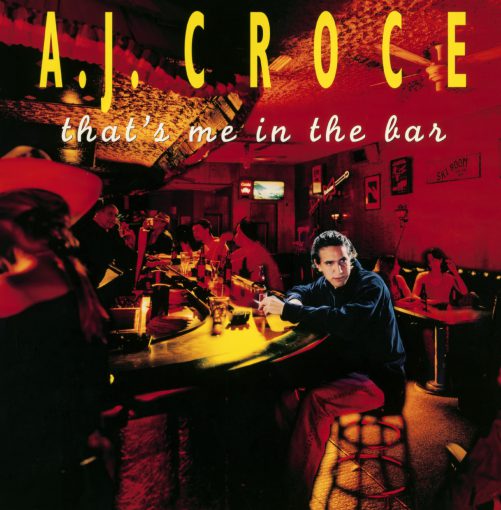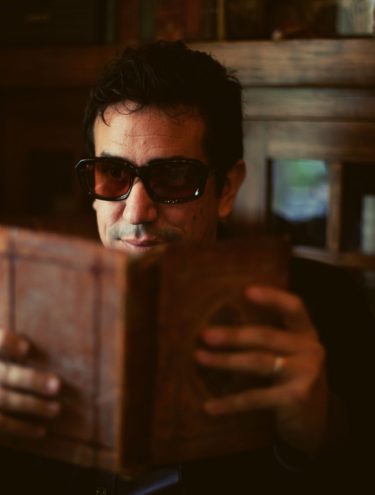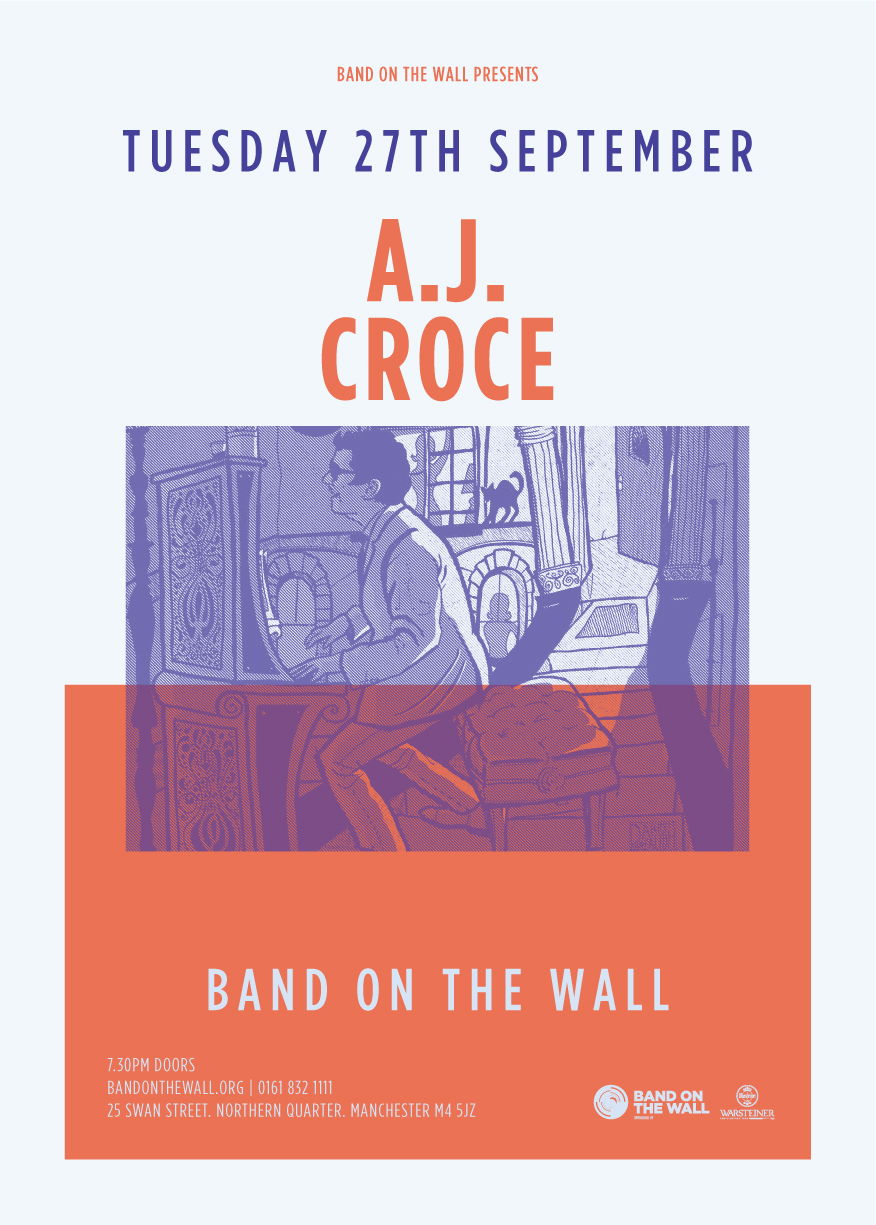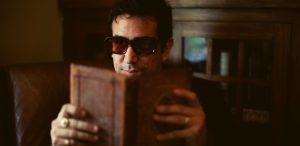Songwriter A.J. Croce hails from Nashville; a musical hotbed known for its country music, but a City that is also home to session players associated with Stax and Sun records, Southern soul and R&B music as well as jazz and gospel music scenes. Much of this great American music, found in Nashville and beyond, bleeds into A.J. Croce’s writing, just as it influenced the songs of his father; revered folk-rock artist Jim Croce
A.J. released his first album in 1993 and throughout the subsequent years has developed as a songwriter and performer, working with figures who have assumed legendary status in American music. Through his father and as a result of his individual talents, he has had the privilege of knowing and working with many greats, and has some incredible stories from his life in music as a result.
Ahead of his UK tour, which sees him performing at Band on the Wall on 27th September, we spoke to A.J. about his latest musical project, the idea of musical versatility and the similarities between his and his father’s introductions to music.
You have been writing for a new project recently, how has it been going? What flavours are you recognising in the music, and are we likely to hear new songs tested on the road?
The writing is steady and the ideas are flowing. There’s a lot of new and old ideas, some simple and others sophisticated. The new album is inspired by soul music of all kinds, the criteria; “is it soulful? Let’s do it”. Most of the time I write alone but I’ve got a few co-writes, one with Dan Penn, one with Leon Russell and one is a more Americana take on soul that I wrote with Robert Earl Keen. John Simon has agreed to arrange one of the songs and the Muscle Shoals Horns have arranged a couple that they played on. I’ll arrange the rest. Arranging and pre-production is critical when you have a tight budget. I’m lucky to have made friends with talented folks who are all helping out. The McCrary Sisters are singing beautifully on the new project. So far it looks like the band is based in Nashville, Muscle Shoals and New Orleans. It’s funny that most people associate Nashville rightfully with Country but since Sun Records and Stax the session players have mostly moved here to Nashville.
Dan Penn is producing and we’re recording in mono on 2″ tape, 16 track (all tape and no digital). It took a session before Dan suggested that we record it like the 3 track sessions of The Letter that he wrote and produced for the Box Tops. We started the sessions recording live and overdubbing background and horns because there’s just enough room at Dan’s studio for 4 or 5 of us to record at once (which is pretty traditional) but we had too many mics/inputs. The adjustment in perspective and fewer mics gave us that old feeling of “what will we ever do with 16 tracks”.
I’ll be playing new songs every night I perform. Trying out ideas and getting the phrasing and arrangements ready for the rest of recording in October.
Who are the musicians you’re currently perform live with and for how long have they been a part of your live group?
My band is ever changing, sometimes I play solo. For years I’ve performed as a duo with Michael Bizar on bass and guitar. Lately in the U.S. I’ve worked with some talented percussionists for duo shows. My band in the U.S. varies, either Gary Malabar (Van Morrison/Steve Miller Band) or Tony Morra on drums, David Barard (Dr. John/Allen Toussaint), Davey Faragher (Elvis Costello…) on bass. When I can I work with Tanya Boutte, Margie Perez, Arsene DeLay and Danon Smith for Background Vocals (all are New Orleans based), though currently recording with the McCrary Sisters, my upcoming European shows will have David Curtis on bass, Tony Morra on drums and Michael Bizar on guitar.
There’s a group in Holland called the Alluring Ajettes led by three women, who have covered my music for the last 20 years with a large band. They will join me on background vocals for the Dutch shows. It’s funny to even think that there’s a band that just covers my music, It’s humbling to find that my music lives outside my own head.
Upon getting your first recording deal in the early ’90s you were working with renowned musicians from the outset; people like T Bone Burnett and Jim Keltner, who were affiliated with some of your favourite artists. How confident were you as a young musician embarking on a project with those musicians, and what did the experience teach you about recording and the business?
When I started recording I was new to the whole thing. I’d performed live since I was young and written my own music, though unlike today where you just record an album on pro-tools and upload it to the world, it was an expensive endeavor, so most people had to be signed by a label . I didn’t know who T-bone was except that he was involved with a good Elvis Costello record and only knew Jim Keltner from Ry Cooder and Randy Newman (I’d later find out what a legend he was), we became good friends and Jim produced my 2nd album.
I was really in awe of John Simon because of his amazing work with The Band, Paul Simon, Janis Joplin, Taj Mahal and everyone else he produced and arranged. He conducted every session (because everything was live and recorded and mixed in 5 days).
I was also blown away that all these legendary jazz players were on the first session. Half the band had been with Miles and/or Basie and the other half were Dylan alum. I went with it, T-bone was assuring but Keltner broke it down by saying “the only difference between studio musicians and everyone else is that we can count to 4 better”.

You listen to a vast range of music, blues to popular music, jazz and African music; does this help with your versatility as an artist and writer? Have you learned key lesson from particular musical styles?
Everyday, I learn something from listening or playing. Every person that I’ve ever played with I’ve learned from, (many who are not particularly great players). Applying all of it is another story because it doesn’t all apply to every song but keeping an open mind allows a new song to go new places.
You’ve found from old tape recordings that yourself and your father were drawn to some of the same blues material from the 1920’s, by musicians like Fats Waller and Mississippi John Hurt. Do you feel this music, or any other particular style of music, is the bedrock for what you and your father did and do as songwriters?
At the time of writing this I’m 15 years older than my father. It’s hard to say what he would have distilled from the roots of his influences and his contemporaries. My dad drew from a lot of places and knew a lot of music but his original music really drew from a couple obvious places. First he wrote character songs that drew from 40’s and 50’s R&B/Rock and roll (Leroy Brown, Speedball Tucker, Rapid Roy…) the lyrics come more from the Leiber & Stoller school than Otis Blackwell. The other side of his strongest influences, (in the 2 years he recorded) were from folk music. There’s Elizabethan folk and the folk of Woody and Leadbelly.
My influences are more complicated and varied. I’ve always felt that the fewer influences an artist had, the easier they were to describe and the more boring the music has the potential for being.
I’ve pulled from five continents of music history most of all from the US, where I’m from. In the end, the best I can do is to write and play the music that’s in my heart. I guess that’s why I call it soul music.




